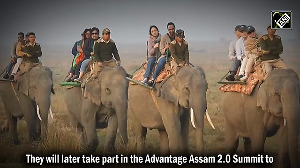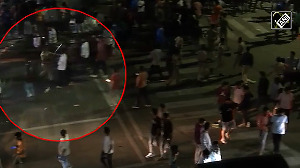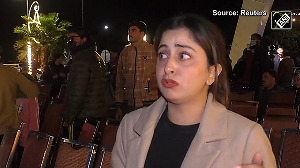
Part I: 'We are neither Pakistanis nor Kashmiris'
When Pakistani troops and irregulars occupied a large part of the then independent state of Jammu and Kashmir in November 1947, only a small chunk of 4,000 square miles was designated 'Azad Kashmir.' The rest of the territory, more than 28,000 sq miles of rugged, mostly inhospitable terrain comprising the remote, backward areas of Gilgit and Baltistan, was hived off and designated the Northern Areas.
But the people of this region, who prefer to call it Balawaristan, insist that they have been illegally occupied and are now seeking independence.
In the second and concluding part of an exclusive interview with rediff.com Senior Editor Ramananda Sengupta, Balawaristan National Front acting chairman Nawaz Khan Naji explains why Pakistan's occupation is illegal and what his people expect from the current efforts of India and Pakistan to resolve the Kashmir problem.
Do people from this area have any representation in Pakistan?
No. Because we are not in the constitution of Pakistan, we cannot cast a vote or stand for a parliamentary post in Pakistan. We cannot appeal to the Supreme Court of Pakistan.
We are foreigners, actually. It is completely an occupation. Article 8 of the agreement signed between Islamabad and the government of Azad Kashmir in March 1949 says Pakistan will think about Gilgit and Ladakh only after a decision on Kashmir. This agreement is between Pakistan and the AJK government, between Gurmani [Mushtaque Ahmed Gurmani, minister without portfolio, government of Pakistan], Sardar Mohammed Ibrahim Khan [president of 'Azad Kashmir'], and Choudhary Ghulam Abbas [head of the All-Jammu and Kashmir Muslim Conference].
Who are these people? The people of the Northern Areas don't know them. We did not cast a vote for Ghulam Abbas or Ibrahim. There was no Muslim Conference, and there is still no Muslim Conference in Gilgit. So how can the head of the Muslim Conference sign an agreement with Pakistan about that area? Our president was Raja Sharif Khan, and the AJK president was Sardar Ibrahim. So how can Ibrahim sign an agreement on Balawaristan? Our president was expelled and appointed a civil services officer! Our army chief was Colonel Khan, who was demoted to lieutenant!
How does the peace process between India and Pakistan affect your movement?
We support and appreciate the peace process. We are very happy about this situation. We call on them to discuss the Kashmir issue, particularly the issue of Balawaristan. We are an oppressed people.
You say you are a separate nation, yet you want two other nations to discuss your status?
According to the UN resolutions, Pakistan and India are parties to the Kashmir dispute. We don't have the power to fight these countries. Therefore they should discuss, but without our will it is impossible to solve the problem. They should satisfy the Kashmiris, they should satisfy the Balawar people. Only then can the problem be solved.
First, these countries must make peace, and then they should discuss Kashmir and Balawaristan. If they are fighting each other, it is not a good situation for us. Which is why we support the peace process. After that, the two countries should discuss with us the problem. The Indian government should discuss with the Hurriyat Conference, and the Pakistan government should discuss with the BNF, Gilgit-Baltistan National Alliance, and other parties in Balawaristan, like the Hurriyat and Advani [are doing]. Only then can we put forward to Pakistan what we want, and do something for our future.
What exactly do you want?
In the political process, there will be some flexibility. But actually we need our own state, our own identity. If we become an independent nation in the world, we will be very happy, but if Kashmiris are adjusting with Indians, then we can adjust with Pakistan, not on the basis of annexation, but perhaps a confederation, a union, it is possible. But we cannot become a province of Pakistan. That is not negotiable.What do you mean by autonomy?
Autonomy means our assembly which we elect by vote, will make laws, rules, and elect the chief executive. The government should be by chosen representatives of the people.
You just spoke of two other parties in the area. How much representation do they really have?
I spoke of the Gilgit-Baltistan National Alliance. They are all parties, nationalists, religious groups, Pakistan-based parties, they have joined this alliance.
Autonomy till a decision on Kashmir, like the AJK setup, we should have got that in 1947. We are not averse to autonomy. But with the decision on the Kashmir dispute, we are the fourth party to the dispute. India, Pakistan, Kashmir and us. We will decide our area's future. They will not impose any solution on us, which we will resist. This is the second point of the alliance. Therefore they should contact us and satisfy us. If we are not satisfied, Kashmiris are fighting against India, we are ready to fight against Pakistan, politically, and in every field.
But how strong are you on the ground?
It is very difficult to fight against a power, but we can pursue it perhaps in a democratic way, peacefully. Now the world has become a global village and everyone can see what is happening in our area. We will cry against this oppression, we will build pressure on Pakistan to accept our basic rights, our identity. If big power will crush weak people, America will crush India, India will crush Pakistan, and Pakistan will crush Balawaristan... this is not the human way to do things. There are too many weak nations in the world, yet they are recognised as nations. We must be recognised too. If, however, our people want to go with Pakistan, then we will accept it. If our people want independence, the international community should be helpful.
What has been Pakistan's response to your call for talks?
Pakistan cannot give us independence, for sure. But after our crying, our protests, the government is starting to do something for our area. They are gradually upgrading the democratic system. Like the Northern Areas Council has become the Northern Areas Legislative Council, which has local representation, though the chairman is the chief executive and Kashmir affairs minister, who is from Pakistan. The posts of speaker and deputy speaker have been introduced. And there is an elected deputy chief executive, but a deputy is a deputy. But gradually, very slowly, we are going for autonomy. This has been achieved only through our efforts. Otherwise, Khyber, Mohmand, Waziristan, all are agencies, where it is not necessary to create councils of legislators.
Earlier, the deputy commissioner was the chief of the supreme court of the area. But following our cry, our struggle, they appointed a chief or judicial commissioner, and now there is a chief court, equal to high court, and they are preparing an appellate court.
All these are local appointments?
The chief justice is from Islamabad, the other judges are local. In every department, the chief is from Pakistan, the other, secondary positions are locals.
How strongly is your struggle linked to the Kashmir issue?
It is very strongly linked to the Kashmir issue. The Pakistan government says [that] until this issue is resolved we cannot do anything for you. Kashmir is disputed for 57 years. But the two sides of Kashmir are enjoying their rights. The Indian side has representatives in the Lok Sabha, Rajya Sabha, even in the Cabinet. They have a legislative assembly and their own chief minister. They have their own high court, they can appeal in the Supreme Court. On the Pakistan side of Kashmir, they have a semi-autonomous state, they have their own flag, they have their own name, they have their so-called president, an elected prime minister, an assembly, a huge Cabinet, budget. Then, on the Indian side, they are protected by the law which says a non-Kashmiri cannot buy property in Kashmir. But we have nothing.
Nothing?
We have no president, prime minister, parliament, courts, and the Pathans are buying property and our cities are becoming Pathan-majority cities, where our locals are becoming minorities. We have no right to cast votes in Pakistan, nor in Azad Kashmir. Like a no-man's land. We are the last colony in the world. For 57 years we have been hoping for an end to the Kashmir dispute. But our patience is running out fast. Our struggle will be fast, and we will do something with the occupiers.
What about Pakistani claims that India is fomenting trouble in the area?
We say India is not initiating anything in the area. People who say this are liars. India claims Gilgit-Baltistan. But it is doing nothing for it. Pakistan says India claims the area, so we cannot do anything for you. India should do something for them. Only a claim is nothing. Pakistan claims Kashmir, and its supporters are working in that region, in Indian-held Kashmir. But what is India's role in Gilgit-Baltistan? Nothing. Indians do not appreciate enough. They did not exploit us. On Doordarshan, in your newspapers, there is no news of Gilgit-Baltistan. No news anywhere. India says PoK, Pakistan says Kashmir, but no one thinks of us. Pakistan says Gilgit-Baltistan is not part of Kashmir. India should highlight all these things, but it does nothing!






 © 2025
© 2025